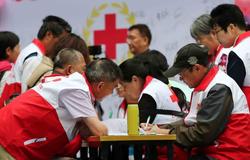 People sign documents saying they are willing to donate their organs after death in Hangzhou, Zhejiang province in this file photo. (PHOTO / CHINA DAILY)
People sign documents saying they are willing to donate their organs after death in Hangzhou, Zhejiang province in this file photo. (PHOTO / CHINA DAILY)
Organ transplants in China have proceeded at roughly a normal rate during the COVID-19 pandemic, making it one of the few countries in the world with a steady number of organ transplants this year, experts and officials said.
The prompt control of the virus, growing acceptance of voluntary post-mortem organ donations, and timely preparations made by organ transplant workers have all contributed to ensuring the nearly normal pace, they said.
The prompt control of the virus, growing acceptance of voluntary post-mortem organ donations, and timely preparations made by organ transplant workers have all contributed to ensuring the nearly normal pace
Guo Yanhong, an official of the National Health Commission, said China had performed 17,114 organ transplants this year, as of Tuesday.
Last year, 19,462 organ transplants were performed, she said during the Fifth China-International Organ Donation Conference, held in Guangzhou, Guangdong province, on Saturday.
Health commission data released on Saturday showed that the number of organ transplant surgeries in China slipped in February and March when anti-COVID traffic restrictions and the lockdown were strictly implemented. When the containment policies began to ease in early April, the number quickly rebounded and kept climbing.
"Regarding the number of organs donated annually, China continues to rank second in the world," said Wang Hesheng, vice-minister of the National Health Commission, adding that the survival rate for organ recipients in China is also in the leading position.
READ MORE: Belt, Road nations set up alliance on organ donation
Lung transplants for COVID-19 patients who were cured but suffered severe lung damage have yielded positive results; some have recovered and been released from hospitals.
As of Thursday, there had been 5,000 transplants from deceased donors, Guo said. Last year, 5,818 post-mortem organ donations were made.
China began a trial program a decade ago to promote voluntary post-mortem organ donations and the practice has gradually been implemented nationwide.
Since 2010, more than 33,000 people have donated their organs after death, yielding over 93,000 organ transplants, Guo said.
Huang Jiefu, chairman of the China National Organ Donation and Transplantation Committee, said most countries have suspended or delayed organ transplants due to the spread of the novel coronavirus, but China has overcome the challenge.
ALSO READ: More people signing up as organ donors
Registrations up 50%
One significant reason is that the country has effectively gained control over local transmission of the virus, creating favorable conditions for medical workers and organ transplant technicians to continue their work, Huang said.
Social advocacy also played a significant role in increasing the number of voluntary donors, especially post mortem donors.
Yu Fulong, vice-president of the Red Cross Society of China, said about 2.7 million people have registered as organ donors since 2010. "The numbers of post-mortem organ donations have hit records continuously in recent years, greatly easing the shortage," he said.
This year has seen over 950,000 new donor registrations, up by nearly 50 percent from last year, according to the Red Cross.
Meanwhile, medical workers have moved quickly to form and promote plans to balance disease control efforts with the urgent and lifesaving tasks of harvesting and transplanting organs.
Xue Wujun, head of the organ transplant research institute at the First Affiliated Hospital of Xi'an Jiaotong University, said organ transplant experts first gathered in early February to study the novel coronavirus and measures to curb its spread, and to discuss successful methods of continuing organ transplants amid the pandemic.
At least five versions of guidelines to promote their insights on keeping the momentum of organ transplantation were released and shared with organ transplant workers nationwide during the height of the outbreak, Xue said.
"A valuable lesson I've learned is that organ transplant work amid an outbreak must be aligned with national disease control policies," he said.
But shortage remains
Nevertheless, the discrepancy between supply and demand for organs remains prominent in China, as it does internationally.
Guo, the health commission official, said about 60,000 people in China are on the waiting list for a kidney, but only 10,000 kidney transplants are performed annually in the country, resulting in an average wait of five to six years.
She said the State Council is reviewing revisions made to the regulation on human organ transplantation that was first released in 2007. The new draft aims to clarify the responsibilities of related departments and intensify investigations and punishment of illegal action.
Huang, the donation and transplantation committee chairman, said the top health authority launched a campaign in October to improve the operations of the China Organ Transplant Response System and all certified organ procurement organizations.
"The management capability for organ transplants is expected to see marked progress in the next two years," he said.


